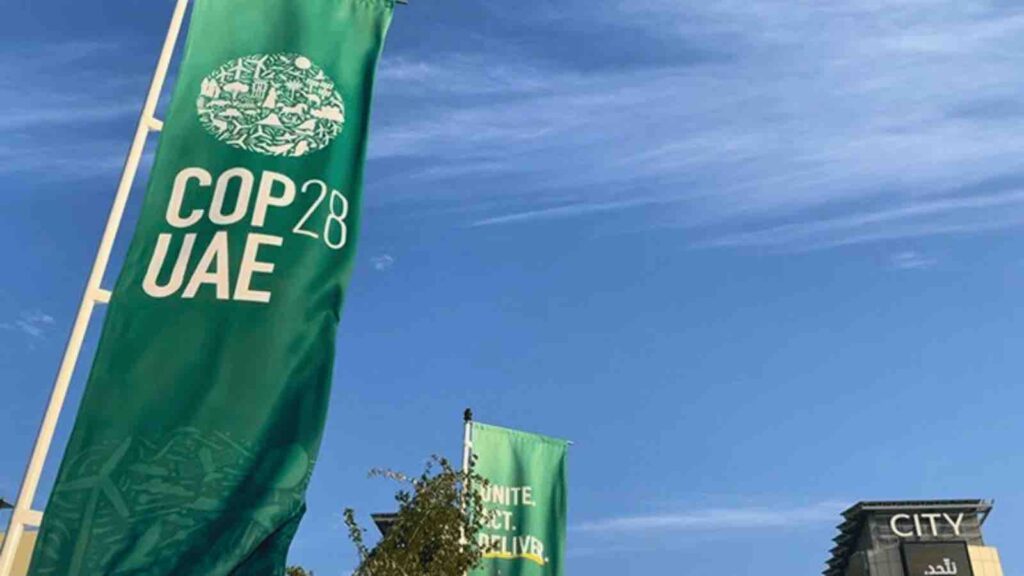As the dust settles on COP28, the world is left to ponder the real impact of these decisions. The outcomes of summit paint a picture of cautious optimism marred by the reality of insufficient action.
DUBAI, United Arab Emirates – The curtains have fallen on COP28, the latest chapter in the United Nations’ ongoing saga to tackle climate change. Held in the opulent backdrop of Dubai, this two-week summit, which concluded today, magnetized global leaders, stirring a whirlpool of pledges, promises, and paradoxes. As the world teeters on the brink of climate catastrophe, the question lingers: What did COP28 truly accomplish?
RELEVANT SUSTAINABLE GOALS


AFact vs. Reality: Unpacking COP28’s Achievements and Challenges
1. The Loss and Damage Fund:
Fact: COP28 established a $700M fund to assist developing nations affected by climate change.
Reality check: A significant step, no doubt, but dwarfed by the grim reality: recent data points to annual losses ranging from $100bn to a staggering $5870bn in these nations. The fund, therefore, covers a mere 0.2% of these losses. With the frequency of climate disasters escalating rapidly, particularly in Asia, this fund is but a drop in the ocean of need.
2. Forest and Conservation Commitments:
Fact : A major breakthrough was the commitment to forest and conservation, with countries like Brazil and Honduras pledging to restore vast tracts of rainforest.
Reality check: The lack of clarity on implementation and effectiveness of these pledges raises concerns about their real-world impact.
3. Fossil Fuel Lobbyist Presence:
Fact : A record number of 2,456 fossil fuel lobbyists attended COP28.
Reality check: A staggering 2,456 fossil fuel lobbyists were admitted to COP28, championing the interests of oil and gas corporations. This data, provided by the Kick Big Polluters Out (KBPO) coalition, reveals a worrying trend. These lobbyists, representing major players like Shell, Total, and ExxonMobil, outnumbered nearly every national delegation, with Brazil (3,081 delegates) and the host nation (4,409 attendees) being the only exceptions.
Notably, the number of fossil fuel lobbyists was seven times higher than the official count of Indigenous representatives, standing at 316. This imbalance, campaigners argue, is indicative of the prevailing prioritization of oil and gas profits over the health of our planet and the wellbeing of frontline communities. A comparison with last year’s COP27 in Egypt shows an alarming increase, where at least 636 fossil fuel lobbyists were present, marking a 25% rise from the 503 in Glasgow the previous year.
4. France’s Forest Finance Packages:
Fact : France’s commitment of $210m for forest conservation in the Congo Basin is commendable
Reality check: The actual impact of this funding on ground-level conservation efforts remains uncertain.
5. Indonesia’s FOLU Net Sink 2030 Plan:
Fact : President Jokowi of Indonesia and Norwegian Prime Minister Støre have unveiled a robust $100 million partnership dedicated to Indonesia’s FOLU Net Sink 2030 initiative. This ambitious project aims to significantly reduce emissions, targeting a decrease of 140 million tonnes of CO2 equivalent (Mt CO2e) by 2030 and striving for an even more impressive reduction of 304 Mt CO2e by 2050.
Reality check: The success of this ambitious plan hinges on effective implementation and rigorous monitoring.
6. COP28 President’s Stance on Fossil Fuels:
Fact : COP28 President Sultan Al-Jaber’s claim that there’s no scientific basis for phasing out fossil fuels to limit warming to 1.5℃ sparked controversy.
Reality check:This statement, juxtaposed against the backdrop of his role as chairman of the Abu Dhabi National Oil Company, raised eyebrows and questions about conflicting interests at the highest levels.
7. Investment in the Colombian Amazon:
Fact : The $34m commitment to the Colombian Amazon by Germany, Norway, and the UK was a positive step.
Reality check: Germany, Norway, and the UK have pledged up to $34 million to tackle deforestation in the Colombian Amazon. During COP28, Norway stepped up with a fresh pledge of $50 million, while the UK announced an additional $44 million, bolstering their prior commitments. However, a report by Rainforest Foundation Norway (RFN) titled “Falling Short” reveals a critical detail: only 16% of the Amazon Fund’s allocations are directed towards Indigenous Peoples and Local Communities (IPLC) tenure and forest management initiatives. While this percentage is notably higher than similar allocations in other funds, such as the World Bank Readiness Fund, which has allocated just 1.4% to this crucial area, there’s room for growth in supporting these vital environmental custodians.
8. The Fossil Fuel Roadmap :
Fact: The summit’s decision to transition away from fossil fuels was hailed as the beginning of the end for these energy sources
Reality check: Nations at COP28 have collectively endorsed a roadmap to phase out fossil fuels within this decade and aim for net-zero emissions by 2050. Though the agreement is non-binding, UN climate chief Simon Stiell views it as signaling the ‘beginning of the end’ for fossil fuels. Countries are committing to a substantial increase in renewable energy, targeting a tripling of output and a doubling of energy efficiency by 2030, in the hope of replacing traditional fuels like oil, coal, and gas. Additionally, the conference underscored the urgency of intensifying efforts to halt deforestation by the year 2030, marking a crucial step in global climate action.
9. Deforestation Agreement :
Fact: For the first time in UN negotiations, a decision has been reached to enhance efforts aimed at halting deforestation by the year 2030. This landmark decision mandates all countries to submit their nature conservation plans within the next year as part of the Global Biodiversity Framework.
Reality check: This agreement offers a ray of hope in the fight against deforestation. However, Toerris Jaeger, Director of the Rainforest Foundation Norway, warns that sluggish progress in reducing fossil fuel reliance poses a significant threat to rainforests worldwide. He emphasizes that without ramping up climate action, the devastation of global rainforests and the communities reliant on them could be catastrophic. “If we lose our rainforests, keeping global warming below 1.5 degrees Celsius will become an unattainable dream,” Jaeger states, underscoring the urgency of intensified climate initiatives.
Fact vs. Reality: Unpacking COP28’s Achievements and Challenges
As the dust settles on COP28, the world is left to ponder the real impact of these decisions. In a year marked by extreme weather calamities, from floods in China to wildfires in Canada, the urgency for concrete climate action has never been more apparent. Yet, the outcomes of COP28 paint a picture of cautious optimism marred by the reality of insufficient action. The true measure of success will not lie in the grandeur of pledges but in the earnestness of their implementation.
In this ongoing battle against climate change, COP28 stands as a reminder of the complexities and contradictions that define our global effort. While there are steps forward, the journey ahead remains arduous and fraught with challenges. The world watches, hopes, and waits, for actions to speak louder than words in the critical times ahead.
You may also be interested in :
The Hidden Cost Of Climate Change : A $16 Million Per Hour Global Price Tag, Study



